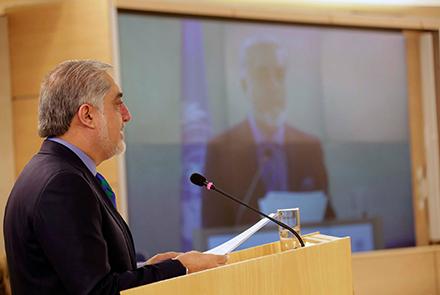Addressing the 37th Session of the UN Human Rights Council in Geneva, Chief Executive Officer (CEO) Abdullah Abdulalh on Monday said that Afghanistan is committed to consolidating its human rights gains through cooperation with its international partners.
Abdullah also stated that a new policy is being drafted for security forces that will go towards protecting civilians during military operations.
“The National Policy on Prevention and Mitigation of Civilian Harm under draft will soon provide specific guidelines to be undertaken during security operations to prevent civilian causalities and damage to their property,” said Abdullah.
He said the economic and development forecast of Afghanistan is strongly linked with achieving durable peace and reconciliation. “For us, human rights are and will be a foundational factor across the board,” he said.
“Afghanistan has, and continues to consolidate its human rights gains. We are now honored to be an elected member of this grand Council – an opportunity to collectively promote and protect the human rights values and principles across continents, for all peoples,” he said.
The CEO said Afghanistan has made significant progress to catch up with international norms and in taking steps to implement them in society.
“Unfortunately, events beyond our control interrupted that process which was restored after 2002. Since then, we have made significant strides to catch up with international norms and apply them to our society,” said Abdullah.
He said however it is not easy for a country that is still under assault and in a state of continued warfare to overcome almost 30 years of various forms of disruptions and institutional weaknesses.
The CEO meanwhile thanked the international community for considering permanent membership to Afghanistan in the council.
“On behalf of the (National) Unity Government, I thank all nations who supported our candidacy, and today as a member of this Council, Afghanistan very much looks forward to working with all other members on the promotion and protection of human rights as a global public good,” he said.
We have endorsed the basic pillars of sustainable development, such as economic, social, as well as environmental goals and the integrated principles of peace, justice, and institutional development.
The CEO said that despite weak infrastructures and closure of schools in conflict-hit provinces, today more than nine million children go to school, almost all children receive vaccinations across the country and recruitment of children in military formations is forbidden.
“Over the past 16 years, we have tried to change our children’s condition for the better through investment in education, health care, public awareness and laws that protect and prevent abuse. In my country, children have been the subject of various violations, especially at times of heightened conflict in the form of terrorism, indiscriminate violence, displacement, lawlessness and poverty.”

